|
Mercedes SLK-class (R171)
Debut: 2004
Maker: Mercedes-Benz
Predecessor: SLK (R170)
|
|
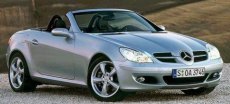 The
name SLK stands for "Sport", "Light" and "Compact", it implies the car
is the compact version of SL, although it is actually derived from the
C-class platform. Since its birth in 1996, the first generation SLK
found
308,000 buyers worldwide, making it the fastest selling roadster after
Mazda MX-5, and perhaps the most profitable one. A number of reasons
contribute
to its success, the most important of which is the electric-folding
metal
roof it pioneered. By touching a button, the roof raised seamlessly
from
the boot and converted the SLK from a convertible to a hard-top coupe.
People loved the high-tech feel it brought. This feature remained
unique
in the world until the arrival of Peugeot 206CC. The French took almost
5 years to imitate this idea! The
name SLK stands for "Sport", "Light" and "Compact", it implies the car
is the compact version of SL, although it is actually derived from the
C-class platform. Since its birth in 1996, the first generation SLK
found
308,000 buyers worldwide, making it the fastest selling roadster after
Mazda MX-5, and perhaps the most profitable one. A number of reasons
contribute
to its success, the most important of which is the electric-folding
metal
roof it pioneered. By touching a button, the roof raised seamlessly
from
the boot and converted the SLK from a convertible to a hard-top coupe.
People loved the high-tech feel it brought. This feature remained
unique
in the world until the arrival of Peugeot 206CC. The French took almost
5 years to imitate this idea!
However,
the first generation SLK had various flaws preventing it from
challenging
Porsche Boxster. First of all, it was derived from the contemporary
C-class,
sharing the same old-fashion recirculating-ball steering which lacked
feel.
Secondly, its chassis was not very stiff, therefore when AMG modified
it
into SLK32 AMG it had to stiffen the suspensions to the extent that
hurt
ride quality. People saw it as a hot rod, very un-Mercedes indeed.
Thirdly,
the SLK never received any great engines. The early cars relied on a
rough
Kompressor 2.3 four-cylinder. A much more refined 3.2-litre V6 joined
in
2000, but it lacked the eagerness of its BMW and Porsche rivals.
Therefore,
although it was commercially successful, car magazines liked to call it
"hairdresser's car". In other words, high on image, low on
ability.
Comparatively,
the second generation SLK, codenamed R171, is a much more complete
product.
It might be lack of surprise and innovation, but it is highly
competitive
in most important areas, from build quality, comfort, handling, engine
to performance. The only weakness is price - at 34,000 pounds, SLK350
is
not only more expensive than Nissan 350Z, BMW Z4, Audi TT V6, Lotus
Elise
111R, Honda S2000, but also overshadows Porsche Boxster. However, it is
also the premium pricing proves that the car is very good, because
discounts
only appear in undesirable cars.
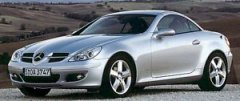 Like
the old car, the new SLK is derived from the C-class platform, but this
one is the latest W203 C-class. It uses rack-and-pinion steering, a
3-link
strut-type suspensions up front and a multi-link setup at the rear. The
body is slightly but not overly larger, with a wheelbase stretch of
just
30mm to free up legroom. Basically, the SLK floorpan is a shortened
version
of the C-class, with 285mm chopped from the wheelbase. Therefore it is
lighter and more agile than the C-class. Exterior design is smoother
and
sleeker. A more steeply raked windscreen and a smoother fastback reduce
drag coefficient to 0.32. The most striking feature is a F1-style nose,
making it look like a comical version of SLR, funny. Like
the old car, the new SLK is derived from the C-class platform, but this
one is the latest W203 C-class. It uses rack-and-pinion steering, a
3-link
strut-type suspensions up front and a multi-link setup at the rear. The
body is slightly but not overly larger, with a wheelbase stretch of
just
30mm to free up legroom. Basically, the SLK floorpan is a shortened
version
of the C-class, with 285mm chopped from the wheelbase. Therefore it is
lighter and more agile than the C-class. Exterior design is smoother
and
sleeker. A more steeply raked windscreen and a smoother fastback reduce
drag coefficient to 0.32. The most striking feature is a F1-style nose,
making it look like a comical version of SLR, funny.
The
new car has improved the roof further, reducing the time needed for
opening
or closing to 22 seconds. Moreover, it follows its bigger brother SL to
use a rear window which automatically rotate 180-degree to save boot
space.
In this way, when the roof is stored, the boot still offers a generous
208 litres of luggage space, 63 litres more than before. When the roof
is up, it increases to 300 litres.
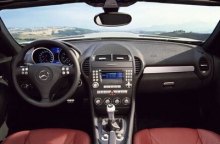 Better
news is found in the cockpit: Ladies and Gentlemen, first-class quality
has finally come back to Mercedes-Benz! since the 1996 E-class,
Mercedes
sacrificed its long-standing reputation as the world’s highest quality
mass production cars in order to cut cost. Its bosses thought the
3-pointed
star brand can sustain the damage, but unfortunately, customers, car
writers
and J.D. Power are not easily fooled. The market gradually perceived
that
Mercedes cars lag behind Audi, Volkswagen and BMW in quality. Thanks
God,
in the new SLK, Mercedes is finally determined to fight back. Here in
the
cockpit, you can see a beautifully made dashboard combining the style
of
Alfa Romeo and the quality of Audi. Soft-touch plastic is used
throughout
the cabin. All the grab handles, switches and buttons are well damped
to
deliver a quality feel. Dark plastics are decorated with blue LCD and
alloy-effect
buttons / shifter. Welcome back to a real Mercedes-Benz! Better
news is found in the cockpit: Ladies and Gentlemen, first-class quality
has finally come back to Mercedes-Benz! since the 1996 E-class,
Mercedes
sacrificed its long-standing reputation as the world’s highest quality
mass production cars in order to cut cost. Its bosses thought the
3-pointed
star brand can sustain the damage, but unfortunately, customers, car
writers
and J.D. Power are not easily fooled. The market gradually perceived
that
Mercedes cars lag behind Audi, Volkswagen and BMW in quality. Thanks
God,
in the new SLK, Mercedes is finally determined to fight back. Here in
the
cockpit, you can see a beautifully made dashboard combining the style
of
Alfa Romeo and the quality of Audi. Soft-touch plastic is used
throughout
the cabin. All the grab handles, switches and buttons are well damped
to
deliver a quality feel. Dark plastics are decorated with blue LCD and
alloy-effect
buttons / shifter. Welcome back to a real Mercedes-Benz!
SLK
has 3 engines to choose from. The base model is SLK200 Kompressor. It
uses
the M271-series 1.8-liter (yes, not 2.0) introduced to C-class
recently.
It has balance shafts, variable valve timing and supercharger to pump
out
163hp and 177lbft. Performance is adequate rather than remarkable, but
it is tractable, fuel efficient and fulfills its job well as an
entry-level
engine.
Next
one, SLK350. This is also the pick of the range and expected to be the
best seller. The 3.5-litre V6 is not a development of the existing 3.2
V6 but the first member of a new generation V6 / V8 family. It packs a
lot of advanced technology such as all-alloy construction, continuous
dual-VVT,
2-stage variable intake manifolds and, you guess what, the return of 4
valves per cylinder! I remember in 1996 when Mercedes switched back to
3 valves per cylinder it declared that was the only way to pass future
emission regulations. The premature conclusion did not come true.
Today,
Mercedes is eating its words and relaunching 4 valves per cylinder
engines.
The new 3.5 V6 pumps out a remarkable 272hp and 258lbft, more than all
rivals bar Nissan 350Z.
The
top model is SLK55 AMG, powered by the same engine as C55 AMG - a 360hp
/ 376 lbft 5.5-litre V8 that belongs to the old generation V6 / V8.
However,
I will leave this car in a separate report. Now let’s focus to the
mainstream
SLK350...
The
new V6 is excellent - powerful, flexible, creamy smooth and produces
exciting
exhaust note once you push it. You might say these descriptions can
also
be found in rival engines, so let us compare with our benchmark, BMW's
231hp 3.0 inline-6. The Mercedes V6 is 500cc larger, but it achieves
the
same efficiency as the smaller BMW engine. That translate to an
advantage
of 41 horsepower and 37 pound-foot of torque. Its bottom-end torque is
especially astonishing: a total of 258 lbft is available from 2400 to
5000rpm,
225 lbft of which (already more than the maximum BMW can generate) is
available
from as low as 1500rpm ! the Mercedes V6 also produces a sonorous
exhaust
noise eclipsing the civilized BMW. The only deficit is that it does not
rev as high as the BMW. Its maximum power occurs at 6000rpm and engine
cut out at 6400rpm.
 The
V6 mates with a new 6-speed manual gearbox whose shift quality is much
improved from the last generation. It is not as super-slick as some
Japanese
products, but clean and precise enough. According to Mercedes, with
this
gearbox SLK350 can sprint from rest to 60mph in 5.5 seconds.
Nevertheless,
it is beaten by the new 7G-Tronic automatic transmission by 0.1
seconds,
because the latter has a total of 7 forward gears ! now driving
enthusiasts
are puzzling which one is the best choice - automatic for sheer speed,
manual for pure fun. The
V6 mates with a new 6-speed manual gearbox whose shift quality is much
improved from the last generation. It is not as super-slick as some
Japanese
products, but clean and precise enough. According to Mercedes, with
this
gearbox SLK350 can sprint from rest to 60mph in 5.5 seconds.
Nevertheless,
it is beaten by the new 7G-Tronic automatic transmission by 0.1
seconds,
because the latter has a total of 7 forward gears ! now driving
enthusiasts
are puzzling which one is the best choice - automatic for sheer speed,
manual for pure fun.
Performance
is definitely a strength of SLK350. Apart from the flyweight Lotus
twins
(Elise 111R and Opel Speedster Turbo), I can't think of any roadster in
this segment can beat it. Honda S2000 and Nissan 350Z Roadster maybe
the
closest to 60mph, but none can rival the Mercedes' superior performance
above 100mph. According to Autocar's test, SLK350 with manual gearbox
arrives
60mph in 5.6 seconds and 100mph in 13.6 seconds. An excellent condition
S2000 did that in 5.6 sec and 14.3 sec respectively, while 350Z
recorded
5.8 sec and 14.2 sec - but that was a coupe instead of the heavier
Roadster.
The main rivals are slower: BMW Z4 3.0 took 5.6 sec and 15.9 sec.
Porsche
Boxster 2.7 needed 6.3 sec and 15.2 sec. They are simply not in the
league
of SLK350. There is one exception however - Chrysler Crossfire SRT-6.
But
I think few people would consider a Chrysler-badged roadster derived
from
the old SLK when they can get the new and real SLK.
On
the road, apart from the superior speed and flexibility, the new SLK
also
impresses its driver by its comfortable ride quality. Mercedes is still
the only German car maker knowing how to deal with broken surfaces as
well
as Autobahn. Even on British B-roads, the SLK makes use of its
long-travel
suspensions and well-tuned damping to absorb bumps and irregularities.
The result is a supple ride unfound in BMW Z4 and Porsche Boxster,
simply
in the league of C-class.
The
Mercedes also beats BMW for body control and steering feel, hence
overall
handling. It also corners as quick as Porsche Boxster, but there is
more
body roll and understeer, less steering feel and adjustability on
throttle.
In other words, it is neither as inspired nor as involving to drive as
Boxster. After all, the Porsche is a mid-engined sports car with lower
center of gravity and a chassis tuned to please demanding drivers. In
contrast,
the Mercedes is designed to appeal to broader customer base - sales is
expected to be 3 times that of the Boxster. It has to offer a smooth
ride
and a steering free of road harshness when cruising. That said,
Mercedes
has found the right balance point. One example is the steering - at
first,
it feels not very communicative on the straight ahead. The more you
turn
the wheel, the more information flows through. Just when you want to
attack
corners, just when the car approach limit, the steering becomes totally
feelsome.
No
roadster is more relaxed in cruising. Surrounding you is a
beautifully-made
cabin worthing the name "Mercedes-Benz". When the top is opened, wind
flow
and noise are well deflected from the cabin. All you enjoy is the
smooth
running engine, the smooth ride and the rigid chassis so free of NVH.
With
abundance of torque, you don't need to make gearchange. Tall gearing
means
the engine cruises at fairly low rev, hence quietly. This is the best
way
to enjoy the new generation "hairdresser's car" - but this time it is
high
on image, high on ability. A new class leader has arrived.
|
| The
above report was last updated on 29 Jul
2004. All Rights Reserved. |
SLK55 AMG
|
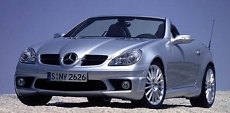 The
3.5-litre SLK has already gunned down Porsche Boxster in our last
report.
So what will it be when mating with a 360 horsepower, 5.5-litre V8 ?
the
answer is a fearsome super roadster. The
3.5-litre SLK has already gunned down Porsche Boxster in our last
report.
So what will it be when mating with a 360 horsepower, 5.5-litre V8 ?
the
answer is a fearsome super roadster.
When
Porsche
refuses to drop
a larger engine into Boxster S, when BMW has no intention to put a
M-power
into Z4, Mercedes SLK55 AMG found itself having no direct rival in the
market. The only thing matching its price and power is TVR Tamora and
Chevrolet
Corvette Convertible, but one can easily see they are different
animals.
Those praising the quality and comfort of Mercedes will never walk into
the showrooms of TVR and Chevrolet. That means the AMG version of SLK
is
actually in a class of its own.
The last
generation SLK32
AMG was powered by a supercharged V6. Recently, AMG abandoned this
engine
and replaced it with a normally-aspirated V8. Running as many as 5439
cubic
centimeters, even though with just one camshaft per bank and 3 valves
per
cylinder, the V8 is capable to pump out 360 horses, or a full 80 hp
more
than the latest Boxster S. Its torque output is even more astonishing -
376 lbft shades the Porsche's 236 lbft. No comparison at all.
Working with
the
world's
first 7-speed automatic gearbox, it accelerates from zero to sixty mph
in a silky 4.7 seconds. That's probably no faster than the old SLK32,
because
the former was lighter and just slightly less powerful, but the way the
V8 responds to throttle is in another league, so is its throaty roar.
It
can accelerate to 124 mph in 17.5 seconds, matching the 3.8-litre
Porsche
911 Carrera S. If not electronically limited, how fast can it go? I
guess
probably 180 mph. A roadster has never been so fast.
The great
chassis
of standard
SLK means AMG only needs to modify the legs to lift its handling to
match
the higher performance. These modifications include a revised front
suspension
geometry, stiffer springs and dampers, thicker anti-roll bars, harder
bushings,
18-inch wheels, wider and lower profile tires and more powerful brakes.
Predictably, grip and body control are excellent. Moreover, the added
weight
to the nose is satisfactorily countered by the tauter suspension setup,
so the SLK55 does not feel nose heavy. The modifications also tightens
the steering, making it feel more direct and accurate than in the
standard
SLK.
With
118 lbft
more torque
than SLK350, the AMG version enables powerslide more easily. As a
result,
attacking corners becomes even more entertaining. At £48,000,
SLK55
AMG is undoubtedly very expensive, but it provides fire-breathing
performance,
superb handling and driving fun in a high-quality, comfortable and
desirable
package. Mercedes-AMG has another winning car. |
| The
above report was last updated on 16 Oct
2004. All Rights Reserved. |
SLK55 AMG Black
|
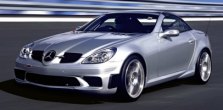 While
SLK63 is just around the corner, AMG has launched the final and
ultimate version of SLK55. It is a limited edition of only 100 cars
aiming for occasional track use, so unsurprisingly it is very expensive
– at £73,000, versus the £50,000 regular SLK55. That's
almost the same price as a Porsche 911 GT3 ! While
SLK63 is just around the corner, AMG has launched the final and
ultimate version of SLK55. It is a limited edition of only 100 cars
aiming for occasional track use, so unsurprisingly it is very expensive
– at £73,000, versus the £50,000 regular SLK55. That's
almost the same price as a Porsche 911 GT3 !
To judge whether it worth the extra money, you must first see what have
been modified. Firstly, the 5.5-litre sohc V8 has received smoother
intake and exhaust breathing, raising its output from 360 to 400hp and
376 lbft to 383 lbft. This also accompany with sharper throttle
response and an angrier noise. The 7-speed automatic
transmission has added a race mode to deliver fast but aggressive
shift.
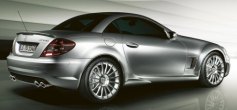 Then
the car has received a diet to eliminate all the unnecessary weight.
The first thing had to go is the retractable roof system. It is
replaced by a fixed roof made of carbon fiber reinforced plastic (CRP).
The wider front fenders are also CRP. Besides, the cockpit has its side
air bags deleted and leather seats replaced by racing buckets. Overall,
the so-called "SLK55 Black Series" is 45 kilograms lighter than before.
0-60mph now takes just 4.4 seconds. Top speed remains regulated at 155
mph, but customers can pay extra to raise it to 300 kph (186 mph). Then
the car has received a diet to eliminate all the unnecessary weight.
The first thing had to go is the retractable roof system. It is
replaced by a fixed roof made of carbon fiber reinforced plastic (CRP).
The wider front fenders are also CRP. Besides, the cockpit has its side
air bags deleted and leather seats replaced by racing buckets. Overall,
the so-called "SLK55 Black Series" is 45 kilograms lighter than before.
0-60mph now takes just 4.4 seconds. Top speed remains regulated at 155
mph, but customers can pay extra to raise it to 300 kph (186 mph).
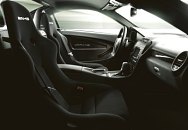 Handling
is improved by the lower center of gravity brought by the CRP roof and
lower ride height, stiffer suspensions, suspension tower brace (to
strengthen the chassis), adjustable dampers, lightweight 19-inch wheels
shod with Pirelli P-Zero Corsa tires and ceramic composite front
brakes. It sacrifices ride quality for superior body control. Handling
is improved by the lower center of gravity brought by the CRP roof and
lower ride height, stiffer suspensions, suspension tower brace (to
strengthen the chassis), adjustable dampers, lightweight 19-inch wheels
shod with Pirelli P-Zero Corsa tires and ceramic composite front
brakes. It sacrifices ride quality for superior body control.
These modifications are professional enough, but it doesn't mean the
SLK55 Black Series can be a serious rival to Porsche 911 GT3 or, to
lesser extent, 911 Carrera S. The SLK is not an inherent sports car. To
sharpen it up you have to sacrifice too much comfort yet fail to find
the same balance and feel of a pure sports car. SLK55 is still better
in its standard form. |
| The
above report was last updated on 7 Aug 2006. All
Rights Reserved. |
SLK facelift 2008
|
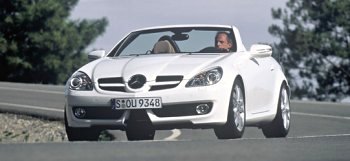
|
SLK350 is the focus of the facelift...
|
About
one and a half year ago Audi TT overtook Mercedes SLK as the new
benchmark of small premium sports cars. Now the SLK strikes back with a
mid-life facelift. The focus model is SLK350, i.e., the fastest selling
model in the range. Its 3.5-liter V6 has received a considerable power
boost of 33 hp to 305 hp and cut-off is raised by 400 rpm to 7200 rpm.
This is made possible by using higher compression ratio (11.7:1 instead
of 10.7:1), faster cam timing, lighter intake valves and lighter
pistons. The torque-enhancing 2-stage variable intake manifold has been
ditched in favour of a faster breathing fixed manifold, so peak torque
now arrives at 4900 rpm instead of the previous 2400-5000 rpm, but the
peak value is lifted by 7 lb-ft. A by-product of the new manifold is a
sportier howl at full throttle. Therefore keen drivers will enjoy the
new engine more on the basis of extra performance and aural excitement.
Brilliantly, fuel consumption is reduced slightly too.
Another improvement is the adoption of a variable ratio steering rack
(in addition to the existing variable assistance). This mean the more
you turn the steering wheel the faster it reacts. It sharpens the
steering response by a welcomed degree, although it still lacks the
true communication of, say, Porsche Boxster's.
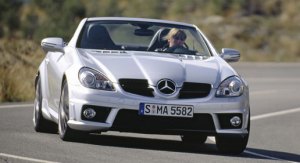
|
SLK55 AMG also gets a new look, but
mechanically still the same.
|
Other
changes
to the SLK are less significant. Externally, the facelift brings a new
F1-style front bumper to match the existing F1-style nose. Internally,
there are some equipment upgrade, such as a new control system with
voice recognition, Bluetooth hands-free, MP3 interface and upgraded
audio system. Mercedes' new "Airscarf" seat is also available as
option. It blows warm air to your neck, so now you can enjoy open air
motoring even in winter.
Apart from SLK350, SLK200 has its 1.8-liter supercharged engine boosted
from 163hp to 184hp. But SLK280 with its 231hp 3.0-liter V6 and SLK55
AMG with its 360 hp 5.4 V8 are unchanged. Therefore the pick of the
range is still SLK350. There is still no other cars in the class
offer the same kind of ride comfort, refinement and clever roof as this
car. Now
being faster and better to steer, it can clinch back the laurel from
Audi. |
| The
above report was last updated on 17 Feb
2008. All Rights Reserved. |
|
|